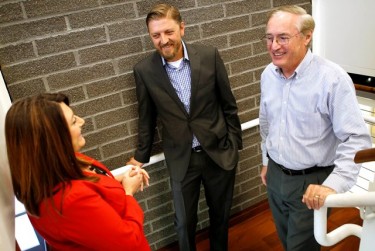Stories by Michael Ferraresi
Photos by Darryl Webb
GCU Today Magazine
For a man dedicated to digital innovation, Jared Stauffer certainly paid homage to the days of analog technology when he decorated his office on the 11th floor of an uptown Phoenix high-rise.
A vintage typewriter sits in one corner against a window that frames northbound Central Avenue and Camelback Mountain in the distance. A wide wooden record player includes a selection of Billy Joel vinyl. On the coffee table, a 1960 edition of Life magazine, featuring a young Billy Graham on a mission trip to Africa, takes up a spot many tech executives reserve for the latest edition of Wired.
Stauffer said the throwback motif reminds him of simpler times since his daily routine at Brinkster, the cloud-hosting company he leads as CEO, often involves complex technological discussions and decisions.
Nearly 15 years ago when he created Brinkster as a Grand Canyon University undergraduate, Stauffer would write code in his campus apartment, more interested in developing a simple free web-hosting space for developers than building a profitable tech firm.
Today, Stauffer stands out as the type of student tech entrepreneur GCU aims to cultivate through its new bachelor’s degrees in computer science and information technology. The University has refined its approach to science curriculum with a focus on drawing Stauffer-like students to the fast-growing Phoenix main campus, where the new College of Science, Engineering and Technology is adding new programs to address STEM-related industry needs.
Brinkster began as a college student’s idea but has since blossomed into a premier cloud services provider with 50,000 customers in 175 countries. Stauffer and his wife, Christine, a former GCU accounting major whom he fell in love with during campus Move-In, grew the company into a leading provider of cloud servers, cloud storage and virtual desktop space that customers can access from anywhere, and “white label” cloud services that other businesses resell under their own brand names. The company lists itself among Amazon, Facebook and Google as one of the only infrastructure-as-a-service providers in the world with its own proprietary hardware platforms.
“It grew out of a need I had as a programmer,” said Stauffer, a GCU Hall of Fame member who grew up in west Phoenix and returned to earn his M.B.A. in management and leadership in 2008. “But I think I was too young at the time to have a grand plan as to how it would turn out.”
Rather than formally studying technology in college, Stauffer learned about programming languages by digesting huge books of code in his free time. The 39-year-old father of four originally graduated from GCU in 1999 and developed the idea for Brinkster in the midst of earning a bachelor’s degree in Christian Studies.
By contrast, over the next few years University leaders plan to unveil an engineering curriculum and develop an interdisciplinary atmosphere where students from many majors work on technology projects in laboratory-style classrooms, likely with the cloud as a central hub for collaboration.
Stauffer said he expects to share his story with new students, to provide cloud technology expertise, and to make himself available to his alma mater for suggestions on how GCU should design new academic programs in science, technology, engineering and mathematics.
“I’m programmed to think like that, about what’s coming next,” he said.
What’s coming next at GCU is a new wave of tech-savvy students intent on shaping academic programs. There’s no telling what type of businesses or projects might be created on campus as those students develop.
New tech degrees
GCU’s focus is not only on cultivating computer systems analysts, database managers, IT security specialists and software engineers — the goal is to link those students to other academic areas into which their niche tech expertise might overlap.
The computer science program offers emphases in game and simulation development, big data and analytics, and business entrepreneurship. IT majors will have the chance to specialize in business entrepreneurship, health IT and technology innovation.
Entrepreneurship classes will be taught by College of Business professors. Tech students interested in building medical technology will have opportunities to interface with the College of Nursing and Health Care Professions.
GCU Provost Hank Radda said tech students will be trained in the same spirit of Christian leadership as any undergraduate student, through the same character-development principles the University has encouraged for decades.
As those students team up on projects, Radda said, their spirit will shine through.
“I imagine the projects our students take on will make a difference for humanity,” Radda said. “The projects they select will likely address issues they’re passionate about. They might include meaningful health care innovations, or software programs and computer simulations, to help create a better quality of life for people.”
Nearly 70 students were accepted into the new tech programs and will begin taking their freshman courses this fall. Science faculty members want those students to begin working on technology projects as soon as their sophomore years.
Projects will take shape in a course titled Team Innovation Experience, which is designed to simulate a real-world project-management model to teach students about the various components of developing technology solutions. Also, by their senior years in 2018, each student in the first wave of computer science and IT will complete a capstone project.
Brinkster, for example, might have been developed as a classroom project, rather than a side project, had GCU offered those tech programs in the mid-’90s. But like floppy disks, MS-DOS and Atari, the recent past is ancient history.
Brian Mueller, GCU’s president and CEO, envisions a future in which the University is not only sending out worship leaders who do meaningful work in God’s kingdom, but also engineers, IT specialists and business leaders.
“We want to create a calling and a theology of work that highlights the distinctiveness of our students across many vocations,” Mueller said. “There is a huge demand for students who excel in STEM-related areas, and our graduates in those fields will be sought after because of the servant leadership, integrity and strong Christian values they bring into the workplace.”
Cultivating ‘STEM’ pros
Over the last two years, GCU has taken an aggressive approach to address Arizona’s deficiencies in grooming STEM-competent students to fill positions in fast-growing tech sectors of the economy.
University leaders project that 70 percent of students on the main campus will be studying in programs related to science, technology, engineering and mathematics by 2020.
In addition to computer science and IT graduates, the University develops others for careers as doctors, nurses, pharmacists, physical therapists, health care administrators, forensic investigators and other science-based positions.
The University plans to merge those academic areas through efforts led by campus centers designed to encourage collaboration around science, technology, health care and business entrepreneurship.
In 2013, GCU hired Dr. Michael Mobley, a former Arizona State University Biodesign Institute director, to help launch the new STEM curriculum.
Part of Mobley’s charge has been to develop relationships with Arizona tech companies to glean industry feedback on what they expect universities to instill in students. Stauffer is one of 11 Phoenix-area professionals on a STEM advisory board for that purpose.
“When we talk about evaluating the needs of industry, we hear them and listen to them in the context of what are the long-term skill sets for any successful employee,” said Mobley, who worked in research and development for Procter & Gamble for nearly 20 years. “The technical skills and qualifications evolve very rapidly, so they’re really more interested in employees who can adapt.”
A survey by the Arizona Technology Council characterized the Copper State as a “relatively low producer” of science and engineering college graduates compared with Alabama, Utah and others.
In another study, the nonprofit STEM education development group Change the Equation reported that “STEM skills have stayed in demand even through the economic downturn.” There are 1.7 STEM jobs in Arizona for every one unemployed person compared with one non-STEM job for every 4.1 unemployed people.
The Arizona Commerce Authority cited data that suggested “55 of every 1,000 private sector workers” in the state are employed in high-tech jobs at firms such as Apple, GoDaddy, Intel and General Motors — companies that recently invested hundreds of millions of dollars to build Phoenix-area tech centers.
Engineering and technology jobs also pay well. According to the U.S. Bureau of Labor Statistics, the median annual salaries for computer science jobs range from more than $74,000 for computer programmers to more than $93,000 for software developers. Some IT jobs, such as computer and information systems managers, earn a median salary of more than $120,000.
“That’s the state of the industry right now,” Stauffer said. “They’re starving for people and there are not enough of them out there.”
‘Problem-solving mode’
Brinkster didn’t happen overnight. It took years for Stauffer to recognize his idea’s full potential and pass on other entrepreneurial opportunities.
As a GCU undergrad, Stauffer first created and managed the website Adworld, an eBay-like site that blended classified ads and auctions. He eventually sold it for “some tiny dollar figure” to barely cover his costs. But that dot-com, business-development experience helped propel Stauffer into other early business ventures before he was 23.
He also launched a website design firm and consulted on information technology projects for Intel and Lehman Brothers before he and his wife cofounded Brinkster.
As part of the STEM advisory board, Stauffer said he has urged GCU to provide students with the opportunity to hone the critical-thinking skills many have intuitively developed at home playing with video games and mobile applications.
“They program your brain to be in that problem-solving mode,” Stauffer said. “It’s a great life skill.
“These next generations that are growing up are more naturally inclined to think this way because they’re so involved with technology, especially around video games. I think video games are very positive things because they teach students how to critically analyze.”
Kathy Claypatch, GCU’s chief technology officer, said she looks to hire well-rounded employees who come from strong technology backgrounds and can adjust to various demands of the IT workplace.
Stauffer, she said, is an example of a former student who has been “in the trenches” throughout the boom of Internet and IT business and can speak to issues with authority.
“The more we can get him involved in what we’re doing, it’s a win-win,” Claypatch said. “He knows what it’s like inside GCU, and he can add value from the outside.”
For more information about GCU academic programs in computer science and information technology, visit gcu.edu/CSET.






































































